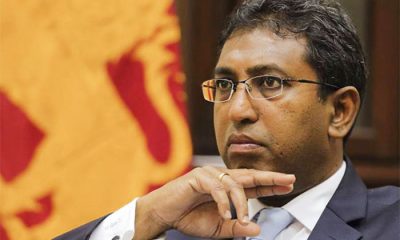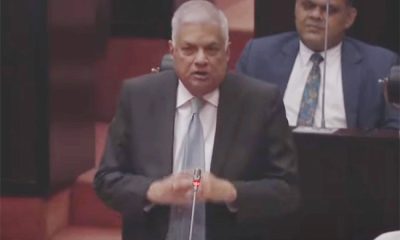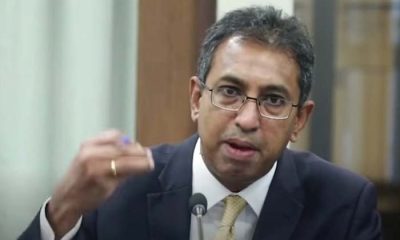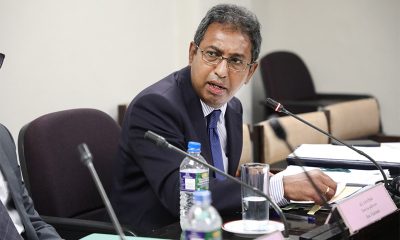News
Debt restructuring: Harsha calls for cautious approach, stresses fair treatment for all
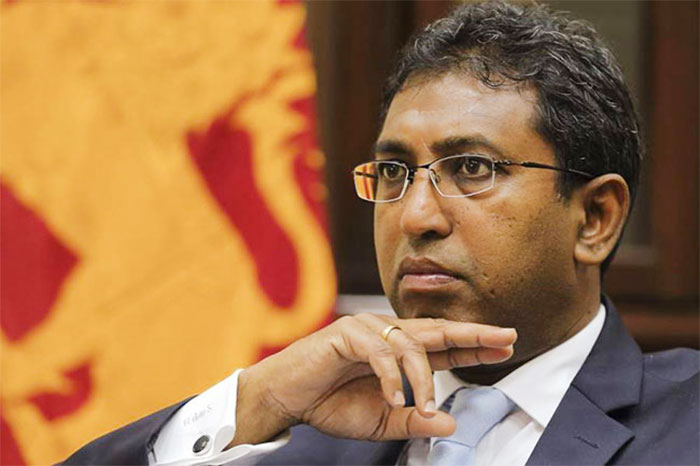
Calling for a cautious approach towards domestic debt restructuring, SJB MP Dr. Harsha de Silva has stressed the need to ensure the stability of Sri Lanka’s financial sector and prevent any unfair treatment of depositors, particularly the EPF and ETF. The Opposition has opposed any haircut on domestic debt under any circumstances, MP de Silva has said, referring to a haircut as a ‘Do Not Cross’ line.
The SJB’s stand is in line with their blueprint on economic, published last year and revised earlier this year, the economist has said.
The former UNP State Minister dealt with debt restructuring at a media briefing held at the Opposition Leader’s Office this week.
The Colombo District MP said that Opposition parties, while cautious about the potential consequences, would discuss the need for careful domestic debt optimization if deemed absolutely necessary. The MP said: “The government plan is set to be presented to the Cabinet today (28) and will subsequently undergo deliberation in the Committee on Public Finance over Thursday and Friday. Pending agreement at the Party Leaders’ meetings, a special parliamentary session is planned for the weekend of 1st and 2nd July to debate the plan.”
The top SJB spokesman said while his party was totally opposed to any plans that include a haircut on domestic debt, they remain committed to protecting the interests of the nation. The MP emphasized the importance of fair treatment of pension funds and depositors without causing further harm to the economy. “The Opposition’s primary focus is on safeguarding the country’s interests and ensuring that any necessary measures are implemented in a responsible and cautious manner,” MP de Silva said.
Dr de Silva said: “Sri Lanka’s economy is contracting daily, regressing to the GDP per capita levels in 2013. To achieve the status of a developed country, as outlined by the President, Sri Lanka needs to sustain a minimum growth rate of 6.5% annually from 2027 to 2048. Merely maintaining the current pace or IMF projected 3% by 2027 will not be sufficient to propel the nation forward. Additionally, the country faces challenges such as reduced demand in global markets and the displacement of low-skilled labour due to technological advancements and automation.”
The primary advantage of pursuing a domestic debt optimization programme lies in the reduction of substantially increased interest rates, allowing the economy to regain stability and promote growth. MP Harsha emphasized that the focus should be on optimizing domestic debt rather than restructuring it entirely. The government has indicated that only treasury bonds will be subject to optimization, not treasury bills. Thus, as treasury bonds carry higher risk, they demand a risk premium. Lowering the risk through the debt optimization program will subsequently lead to a decrease in interest rates, benefiting small and medium-sized enterprises (SMEs) and other businesses, revitalizing the economy. This urgency underscores the importance of implementing the domestic debt optimization plan as soon as possible.
MP Harsha de Silva and the opposition parties are prepared to draft laws and regulations in Parliament to safeguard the interests of the people and creditors. This commitment aims to ensure that any domestic debt restructuring measures are conducted in a manner that prioritizes the well-being of all stakeholders involved. They emphasize the need for transparency and accountability throughout the process.
One of the potential positive outcomes of an effective domestic debt optimization programme would be the revival of the Micro, Small, and Medium Enterprises (MSME) sector. MP Harsha highlighted the importance of providing support and opportunities for these businesses, which are currently facing significant challenges. A well-executed debt optimization programme could help uplift the MSME sector from its current state and foster growth and economic recovery.
As Sri Lanka grapples with the pressing issue of domestic debt, MP Harsha and the opposition parties stress the importance of careful consideration and a cautious approach. They stand united in their determination to protect the interests of the nation while exploring viable strategies for domestic debt optimization. By striking the right balance between economic stability, fair treatment of depositors, and sustainable growth, Sri Lanka can overcome its challenges and pave the way for a brighter future.
Latest News
Members of the National Student Parliament meet PM

Members of the National Student Parliament met Prime Minister Dr. Harini Amarasuriya on Monday [02nd of February] at Temple Trees.
The representatives of the National Student Parliament, representing schools from across the island, visited the Temple Trees following their visit to the Presidential Secretariat and the Parliament.
Expressing her views on the occasion, Prime Minister Dr. Harini Amarasuriya stated,
“The new education reforms were recently initiated starting from Grade One. Discussions are currently underway to include students entering Grade Six this year into the new education reform process in the future. The education reforms will not be halted, and the government is committed to implementing them in a systematic manner without shortcomings”.
She further noted that the reforms are being carried out under five main pillars, with the government’s key objective being to reduce disparities and provide children with quality education, while also nurturing a socially responsible community enriched with human values such as compassion, love for the environment, and a strong sense of civic responsibility.
The occasion was attended by the Deputy Director of Education Kasun Gunarathne, along with officials from the Ministry of Education and representatives of the National Student Parliament.
[Prime Minister’s Media Division]
Latest News
Mrs. I.J. Aberathne appointed Director General of the Department of Trade and Investment Policy

The Cabinet of Ministers has approved the resolution presented by the President, in his capacity as the Minister of Finance, Planning, and Economic Development, to appoint Mrs. I.J. Aberathne to the post of Director General of the Department of Trade and Investment Policy with immediate effect.
News
Cabinet gives green light to provide equipment for the promotion of Aesthetic Education in schools

Although the teaching of art subjects such as music, dance, art, and drama under aesthetic education continues in the Sri Lankan school system, it has been observed that there is a severe shortage of equipment required for this purpose in many schools. Furthermore, a situation concerning the lack of modern equipment suitable for the needs of the children has also arisen, and it has been reported that most equipment available at present is outdated and dilapidated. It has been observed that this condition has an adverse effect on the quality of the aesthetic education and overall personality development of the children.
Therefore, the Cabinet of Ministers has approved the resolution presented by the Prime Minister in her capacity as the Minister of Education, Higher Education, and Vocational Education to implement a project for supplying aesthetic equipment for the promotion of aesthetic education in schools under an estimated cost of Rs. 1,215 million during the period of 2026 to 2028.
-

 Opinion5 days ago
Opinion5 days agoSri Lanka, the Stars,and statesmen
-

 Business6 days ago
Business6 days agoClimate risks, poverty, and recovery financing in focus at CEPA policy panel
-

 Business4 days ago
Business4 days agoHayleys Mobility ushering in a new era of premium sustainable mobility
-

 Business4 days ago
Business4 days agoAdvice Lab unveils new 13,000+ sqft office, marking major expansion in financial services BPO to Australia
-

 Business4 days ago
Business4 days agoArpico NextGen Mattress gains recognition for innovation
-

 Business18 hours ago
Business18 hours agoSLIM-Kantar People’s Awards 2026 to recognise Sri Lanka’s most trusted brands and personalities
-

 Business3 days ago
Business3 days agoAltair issues over 100+ title deeds post ownership change
-

 Business3 days ago
Business3 days agoSri Lanka opens first country pavilion at London exhibition


